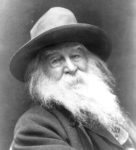
Walt Whitman
Walt Whitman (1819 – 1892) was an American poet, essayist and journalist. He is considered among the most influential poets in the American canon, often called the father of free verse. Born on Long Island in New York State, he lived much of his life in Brooklyn. Whitman worked as a journalist, a teacher, and a government clerk. Whitman's major work, Leaves of Grass, was a poetry collection that he first published in 1855 with his own money. The work was an attempt at reaching out to the common person with an American epic, and he continued expanding and revising it until his death. During the American Civil War, he went to Washington, D.C. and worked in hospitals caring for the wounded. His poetry often focused on both loss and healing. After suffering a stroke in 1873, Whitman moved to Camden, New Jersey to be nearer to family. When he died at age 72, his funeral was a public event, and thousands lined the streets of Camden to watch his funeral procession. He left a strong legacy of work, and was claimed as the first “poet of democracy” in the United States.
Photo courtesy of Creative Commons.
A grand and thrilling poem, inspired by the glowing night skies above us, that speaks to the interlocking connections and kinship of everyone and everything. Continue reading →
Poet Walt Whitman is often called “the poet of the people”, for his earthy take on American life. In this poem, his expansive voice tells of an experience that culminates in a shining moment under a mystical sky. Continue reading →
Along with Emily Dickinson, Walt Whitman is considered one of American’s most important poets. In this radiant poem he transcends patriotism, looking beyond America’s shores to remind us about the inherent beauty of all people. Continue reading →